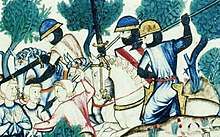lanza
See also: Lanza
Galician

Knights and soldiers armed with swords and lanzas ("spears"), Cantigas de Santa Maria, 13th century
Etymology
From Old Galician and Old Portuguese lança, from Latin lancea, from a pre-Roman substrate of Iberia, probably from a Celtic language, perhaps from Proto-Indo-European *pleh₂k- (“strike”).[1]
Pronunciation
- IPA(key): /ˈlanθa̝/
References
- “lança” in Dicionario de Dicionarios do galego medieval, SLI - ILGA 2006-2012.
- “lanç” in Xavier Varela Barreiro & Xavier Gómez Guinovart: Corpus Xelmírez - Corpus lingüístico da Galicia medieval. SLI / Grupo TALG / ILG, 2006-2016.
- “lanza” in Dicionario de Dicionarios da lingua galega, SLI - ILGA 2006-2013.
- “lanza” in Tesouro informatizado da lingua galega. Santiago: ILG.
- “lanza” in Álvarez, Rosario (coord.): Tesouro do léxico patrimonial galego e portugués, Santiago de Compostela: Instituto da Lingua Galega.
- Falileyev, Alexander (1997). Dictionary of Continental Celtic Place-Names, Aberystwyth University.
Maltese
Spanish
Pronunciation
- (Castilian) IPA(key): /ˈlanθa/, [ˈlãn̟θa]
- (Latin America) IPA(key): /ˈlansa/, [ˈlãnsa]
Etymology 1
From Old Spanish lança, from Latin lancea, of Celtiberian origin.
Etymology 2
Etymology 3
See the etymology of the main entry.
Verb
lanza
Further reading
- “lanza” in Diccionario de la lengua española, Vigésima tercera edición, Real Academia Española, 2014.
This article is issued from
Wiktionary.
The text is licensed under Creative
Commons - Attribution - Sharealike.
Additional terms may apply for the media files.